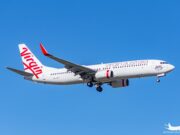Citing continuing terrorist threats to passenger aircraft, U.S. Homeland Security Secretary John Kelly has ordered a package of stepped-up security measures to be implemented for all commercial flights to the United States.
The measures, which the Department of Homeland Security (DHS) said would be “both seen and unseen,” will include enhanced screening of passengers and electronic devices and increased security standards for airports and aircraft, and will be applied to about 2,100 flights carrying 325,000 passengers to the United States daily from 280 airports in 105 countries.
“Terrorists want to bring down aircraft to instill fear, disrupt our economies and undermine our way of life,” Kelly said on Wednesday. “And it works — which is why they still see aviation as a crown jewel target.”
He said the U.S. government is “focused on deterring, detecting and disrupting these threats” through the new security measures as well as the March order to ban electronic devices larger than cell phones from passenger cabins of commercial flights bound for the United States from 10 airports in the Middle East and North Africa.
That announcement in March was followed by suggestions that the electronics ban might be extended to other airports.
In his announcement Wednesday, Kelly said that if airports and airlines “choose not to cooperate or are slow to adopt these measures,” the United States still could extend that ban and could impose additional restrictions — or suspend flights to the United States from noncompliant airports or on noncompliant airlines.
In addition to enhanced screening of passengers and personal electronic devices, the new measures will include increased security around aircraft and in passenger areas, use of more advanced technology and establishment of additional preclearance locations, DHS said.
The restrictions on personal electronic devices implemented in March will be removed if the airports involved comply with the enhanced security measures, DHS said.


